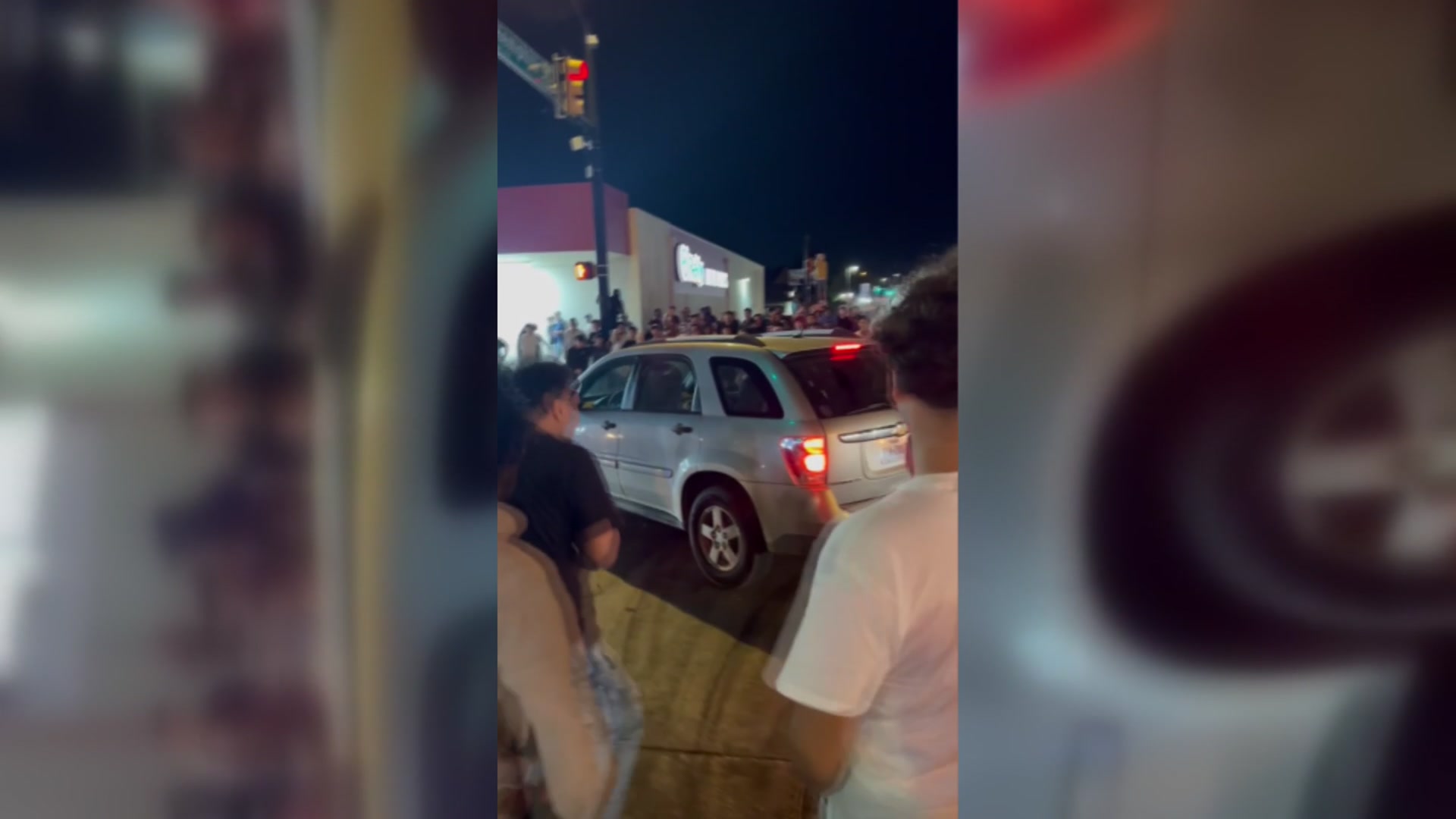A motorcycle rider who tried to outrun a traffic stop in Lake Worth has filed a federal lawsuit claiming the officer used excessive force after he was struck and injured while attempting to escape on foot. The department, meanwhile, says the collision was an accident and that the officer wasn't trying to hit the rider.
According to a lawsuit (read it at the bottom of this page) filed on behalf of motorcycle rider Dustin Bates, Lake Worth Officer Jonathan Granado pulled up behind him while he was stopped at the intersection of Lake Worth Boulevard and Boat Club Road on Nov. 23, 2020.
The officer initially reported the motorcycle's license plate was hard to read but managed to run it through dispatch and learned the number on the plate didn't match the bike.
After the light turned green, dashcam video (see below) shows the officer turning on his lights to try to pull the rider over but instead of stopping the rider accelerated and cut-through traffic to try to get away.
Get DFW local news, weather forecasts and entertainment stories to your inbox. Sign up for NBC DFW newsletters.
Bates led the officer onto Interstate Loop 820 and exited at the next exit, Marine Creek Parkway. It was there where he apparently lost control of the bike and crashed into the grass median separating the ramp from the highway.
Bates, who according to his lawsuit was not hurt in that crash, got up and attempted to run away on foot, crossing the ramp and entering the grassy median to the right of the ramp.
Local
The latest news from around North Texas.
Dashcam video (above) obtained from the Lake Worth Police Department recorded the entire chase and showed the officer exiting the highway in his patrol SUV. In the video, Bates can be seen running across the road as the officer approaches.
The officer then turns the SUV off the paved surface and into the path of the running man. The dashcam video then shows the center of the officer's SUV hitting the man in the back, knocking him to the ground.
In the moments after the collision, an officer can be heard yelling at Bates to put his arms behind his back or risk being shot.
According to the lawsuit, the collision fractured Bates' spine, three ribs, and his right leg in two places. Bates' attorney said he had to undergo surgery "and has permanent scarring as a result of Officer Granado’s unnecessary use of deadly force."
"This is a blatant, flagrant attempt to mow down a person on foot," said attorney Scott Palmer.
Lake Worth Chief of Police J.T. Manoushagian held a news conference Monday afternoon to address the incident, saying his heart sank when he saw the video and that he wishes different decisions had been made that day.
"What I saw on the video is not in keeping with the actions we expect our officers to take," Manoushagian said. "We caused injury to someone and it was due to the officer's poor judgment. I was disappointed. I was sad."
Manoushagian said the officer lost sight of the motorcycle before exiting Marine Creek Parkway and was discontinuing the chase when he saw the cloud of dust that appeared to be the motorcycle rider crashing.
"As he tracked Mr. Bates with his eyes, he began to veer off the roadway," Manoushagian said. "Just as many people do, where your eyes go the wheel of your car follows."
Bates' attorney said the officer's dash camera and the body-worn camera recorded him hitting his client while driving about 45 mph. The suit further alleges that the officer didn't hit the brakes until after crashing into the man.
Get updates on what's happening in North Texas to your inbox. Sign up for our News Headlines newsletter.
Manoushagian also said the officer was traveling at about 45 mph at the moment of impact but said the officer was applying his brakes the entire time he was on the grass. The chief said the officer was traveling at about 95 mph when he hit the exit ramp and had slowed to 74 mph by the time he left the roadway and hit the grass. Manoushagian said the officer kept hitting the brakes but because it was wet he began to slide and that he was still sliding when he struck Bates from behind.
Bates' attorney said his client was "fleeing on foot but was not armed or presenting a threat to any officer or person at the time" and that Granado violated his client's constitutional rights under the Fourth Amendment to the United States Constitution to be free from excessive deadly force and that the use of force "was objectively unreasonable under the circumstances and inflicted unnecessary injury, pain, suffering, and permanent physical disfigurement upon Mr. Bates."
Bates is suing the officer directly, not the department. He has requested a jury trial and is asking for unspecified punitive damages.
The lawsuit was filed Monday in the United States District Court for the Northern District of Texas.
INVESTIGATION INTO INCIDENT, OFFICER RESIGNS
Manoushagian said he visited Bates after the crash to reassure him that the incident would be investigated appropriately but that he was not conscious at the time.
Grand Prairie Police performed a criminal investigation into the incident and the findings were given to a Tarrant County grand jury who, on March 4, 2021, declined to take any criminal action in the case.
Manoushagian said Lake Worth police also conducted an internal investigation and confirmed there were two violations of department policy related to how the vehicle was expected to be operated without causing injury to someone else. The chief said the officer did not break any policy with regard to a pursuit.
The chief said the officer was disciplined with an 80-hour suspension, equivalent to two work weeks, and was assigned to administrative duties until the criminal investigation was no-billed by the grand jury. The officer also underwent additional training on the operation of emergency vehicles and presented a debrief on his lessons learned.
Granado, Manoushagian said, resigned in December 2021. He had returned to duty after the grand jury took no action on the case.
Manoushagian said he "absolutely considered" terminating the officer, but that after reviewing all of the circumstances felt the action taken was appropriate.
"We believe that using progressive discipline and procedural justice is important when dealing and administering justice for our officers. We do have to take into account that everyone makes mistakes in their job," Manoushagian said. "Considering this is a young officer very early in his career … we would never have seasoned, tenured officers who had had the opportunity to learn from mistakes if we fired them all after their first mistake. So, after a review of the circumstances, knowing that this was an accident, the officer did not intentionally mean to strike Mr. Bates with his car, he accepted responsibility for that, he was disciplined for that. I believe that was the right decision given the circumstances."
RIDER HAD A PROBATION WARRANT, DRUGS
Friday afternoon, Manoushagian said though the plate didn't match the motorcycle Bates was riding that it was not stolen.
He said, however, that when Bates was arrested officers learned he had a parole warrant and was in possession of drugs.
"He had a lengthy criminal history," Manoushagian said. "He committed a felony by fleeing in the motorcycle. He was also committing a felony by being in possession of half an ounce of methamphetamine and then on top of all of that had a parole warrant."
Manoushagian said he didn't know why Bates' parole was revoked.
James Roberts, a second attorney for Bates, said all charges were later dropped against Bates.
"I think that it was just a poor decision on his part. He didn’t want to get pulled over," Roberts said.
CHIEF ADDRESSES COMMENTS MADE BY SECOND OFFICER
According to the lawsuit, when Bates told another officer at the scene he'd been run over by the officer's SUV the officer, identified as James O'Bannon, reportedly said, "Probably shouldn’t have run. A lot of people think we can’t chase motorcycles. That’s wrong. We can and we will. Welcome to Lake Worth.”
The suit alleges O'Bannon went on to say, "This is what happens when your run from the law. If you would have just stopped it would have been fine," and, "I'm not going to sugar coat it for you, you run from us this is what happens."
Manoushagian said Monday afternoon the statements made by O'Bannon, quoted above, do not reflect the attitudes and principles of the department and that he received "a very stern talking to" regarding the statement.
"The quote by the officer on [the] scene does not reflect the attitudes and principles of our department. Specifically, the insinuation, of 'Welcome to Lake Worth.' We are a police department that takes tremendous pride in providing excellent service and protection to the public and to the people that we arrest," Manoushagian said Monday. "We take great pride in treating all people with dignity and respect. The statement by this officer does not reflect that. We have and we will continue to address that. All people are welcome here."
Manoushagian clarified that at no point was Bates run over by the officer's SUV. He was struck but was never run over by the vehicle.



